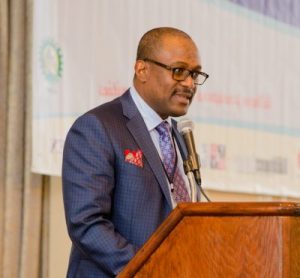
OpeOluwani Akintayo
27 June 2018, Sweetcrude, Lagos — The Nigerian Content Development and Monitoring Board, NCDMB, has commended Nigeria LNG Limited, NLNG, for awarding the contract for the provision of a new liquefied petroleum gas, LPG, ship to a fully indigenous company, E.A. Temile Development Company.
The vessel will serve as the chartered ship by which the NLNG will deepen the delivery of LPG, commonly known as cooking gas, into the domestic market.
E.A. Temile Development Company signed an agreement on Friday in London with Hyundai Mipo Dockyard, South Korea for the construction of the new LPG vessel.
The Executive Secretary, NCDMB, Engr. Simbi Wabote, was a guest at the ceremony and described NLNG’s award of contract to the local firm as a confidence building move and a bold endorsement of local capacities and capabilities.
He added that the development was a manifestation of the progress that had been made in the local content journey and challenged other industry stakeholders to come up with similar initiatives.
“I expect several operators and service providers to get inspirations from this milestone event and see the possibilities in our local content practice rather than the difficulties,” Wabote said.
He also congratulated E.A. Temile Development Company for clinching the important contract and breaking the stereotyped glass ceiling that had often stopped indigenous companies.
He further charged the company to keep within the terms of the contract and deliver safely.
Wabote demanded that Hyundai must look seriously at domiciling key aspects of its activities in-country.
“There is a lot of repeat business and the opportunity is huge with the massive infrastructural deficits in the LPG values chain. You should partner with local businesses for increased in-country value addition especially in the area of maintenance of vessels,” he said.
He stressed that NLNG’s efforts to deepen the penetration of cooking gas tallies with NCDMB’s interventions to utilise oil and gas resources to improve the quality of lives of Nigerians.
The executive secretary regretted that the current level of LPG penetration in the country was still very low, at roughly 1kg per capita consumption compared to Ghana at 4.7kg, Senegal at 9kg, and Egypt at 85kg.



